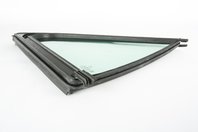Synthetic rubber specialist LANXESS will be adding not one but five new grades to its portfolio of “green” ethylene-propylene-diene elastomers (Keltan Eco) before the end of 2013. This will lead to a further significant increase in the range of applications for this synthetic rubber using ethylene from a state-controlled, biobased source. The five new grades are “drop-in” variants of conventional EPDM rubber grades from LANXESS that are already in widespread use. If all goes according to schedule, they will be commercially available in the second half of 2013.
 “Since the market launch of the first Keltan Eco grade in 2011, we have received a huge amount of positive feedback from the rubber sector,” says Oliver Osborne, Head of Global Marketing at LANXESS’ Keltan Elastomers business unit. “Numerous market players – and not only our own customers – are delighted that there is finally a synthetic rubber with a key component from a renewable source. We are seeing clear signs of considerable interest in greener rubber solutions and this has led us to significantly expand our range of Keltan Eco grades,” he adds.
“Since the market launch of the first Keltan Eco grade in 2011, we have received a huge amount of positive feedback from the rubber sector,” says Oliver Osborne, Head of Global Marketing at LANXESS’ Keltan Elastomers business unit. “Numerous market players – and not only our own customers – are delighted that there is finally a synthetic rubber with a key component from a renewable source. We are seeing clear signs of considerable interest in greener rubber solutions and this has led us to significantly expand our range of Keltan Eco grades,” he adds.
The first Keltan Eco variant, which is now marketed under the name Keltan Eco 5470, is made from biobased ethylene at LANXESS’ Triunfo site in Brazil. It is a general-purpose, medium-viscosity grade with a diene content of around five percent that is suitable for a whole host of applications. “From July, we will be launching no fewer than five additional grades,” reveals Osborne.
The new additions include amorphous grades with a high molecular weight and high diene contents for rapid vulcanization, a high-Mooney variant with a medium diene content and two low-Mooney variants with especially good flow properties. Keltan 6950 Eco and Keltan 9950 Eco (around 9 percent diene), for example, are suitable for the manufacture of solid and foamed automotive glazing seals – still one of the most important applications for EPDM. Applications for Keltan 8550 Eco (around 5 percent diene) include the production of window seals in the construction sector, while Keltan Eco 3050 and 0500R, with their particularly low viscosity and no termonomers containing double bonds, are special grades for oil additives.
“All five products will create many more opportunities for customers who are interested in using biobased EPDM grades, such as producing foamed profiles from a biobased rubber. We have focused on Keltan variants that are already used to very successful effect in their conventional form, which makes it particularly easy for users of these products to switch to the new grades,” says Osborne. “Naturally, the ethylene that we use to produce the new Keltan Eco variants 6950, 9950, 8550, 3050 and 0500R is still made from sugarcane in Brazil,” confirms the Keltan specialist. All five new Keltan Eco grades contain around 50 percent ethylene from this sustainable source.
About LANXESS:
LANXESS is a leading specialty chemicals company with sales of EUR 9.1 billion in 2012 and roughly 17,400 employees in 31 countries. The company is currently represented at 50 production sites worldwide. The core business of LANXESS is the development, manufacturing and marketing of plastics, rubber, intermediates and specialty chemicals. LANXESS is a member of the leading sustainability indices Dow Jones Sustainability Index (DJSI) World and FTSE4Good as well as the Carbon Disclosure Leadership Index (CDLI).
Source
Lanxess, press release, 2013-07-01.
Supplier
Share
Renewable Carbon News – Daily Newsletter
Subscribe to our daily email newsletter – the world's leading newsletter on renewable materials and chemicals










